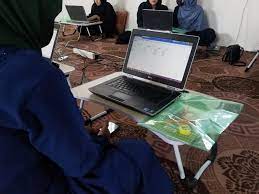KABUL (Khaama Press): The Financial Times, using information from online education networks, says that even though there are problems with internet access, Afghan girls are getting better at learning online, especially in subjects like English, science, and business.
According to the newspaper, the strict policies of the Taliban regime have jeopardized the progress made in girls’ education over the past two decades and have led to growing despair among women and girls in Afghanistan.
The report highlights that the de facto government is considered one of the “most oppressive” regimes globally.
The Financial Times reports that many girls and women in Afghanistan have started using online education like never before to bypass the ban on regular schooling.
Leila Hosseini, a girl who couldn’t go to school in Afghanistan, shares how online education has enabled her to keep learning despite the challenging situation. She’s been studying online for four months, appreciating the peaceful environment that allows her to explore subjects like English, school topics, and photography. Despite facing difficulties due to the high cost and slow internet, she’s determined to continue her online education for a better future.
The report highlights a substantial surge in online learning, with over 21,000 students enrolling at the “People’s University” in the United States in 2023. The Financial Times specifically mentions that commerce and English language courses are in high demand among Afghan students seeking online education.
A Gallup survey conducted in 2022 revealed a significant gender disparity in internet access, with 25% of men but only 6% of women having access. This gap widens in rural areas, where just 2% of women reported having internet access.
Rubina Azizi, the founder of Girls on the Path of Change organization, has been actively addressing the restrictions on girls’ education in Afghanistan. Over the past three years, she has worked tirelessly to offer opportunities and motivation for approximately 600 Afghan girls from Afghanistan, Pakistan, and Iran to participate in online education.
Rubina believes that even though despair is at its peak in Afghanistan, online education provides hope for girls to continue their education. However, she acknowledges that it cannot fully replace the physical presence of girls in schools and universities. Many girls are keen to learn languages like English and German, along with skills like writing, through online education, meeting the aspirations of Afghan youth.
Meanwhile, the Eurasia Review magazine has published a report titled “Life under the Taliban’s Rule,” revealing that nearly 100,000 female students have been prevented from attending universities in Afghanistan. This report suggests that the progress achieved in girls’ education over the past two decades is now at risk of being undone, resulting in widespread despair among women and girls in Afghanistan.







